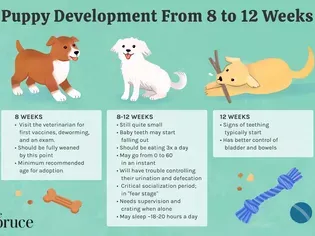Puppy Development From 8 to 12 Weeks
Updated on 04/26/24

Puppy Development From 8 to 12 Weeks: A Comprehensive Guide
Introduction
The puppyhood stage is a crucial period in a dog's life, marked by rapid physical, cognitive, and social development. Between the ages of 8 to 12 weeks, puppies undergo significant changes that lay the foundation for their future health and behavior. This comprehensive guide delves into the key milestones and challenges of puppy development during this period, providing essential insights for dog owners to nurture their furry companions effectively.
Physical Development: Growth and Health
* Rapid Growth: Puppies grow rapidly during this period, gaining weight and height at an accelerated pace. Adequate nutrition is paramount to support their growth and development.
* Teething: Puppies begin teething around 8 weeks of age, which can cause discomfort and chewing behavior. Provide safe teething toys to alleviate their teething discomfort.
* Vaccination: Puppies require a series of vaccinations to protect them from preventable diseases. Consult with your veterinarian to establish a vaccination schedule tailored to your puppy's needs.
* Parasite Prevention: Puppies are susceptible to internal and external parasites. Regular deworming and flea and tick control are essential to maintain their health.
Cognitive Development: Learning and Exploration
* Increased Curiosity: Puppies at this age display an insatiable curiosity and eagerness to explore their surroundings. Provide them with safe and enriching environments to stimulate their learning.
* Socialization: Puppies begin to develop social skills and form attachments during this period. Ensure they have positive interactions with other puppies, people, and animals.
* Housebreaking: Housebreaking puppies requires patience and consistency. Begin training them as early as possible, providing regular opportunities for outdoor elimination.
* Bite Inhibition: Puppies learn to control their biting force between 8 and 12 weeks. Encourage appropriate play behaviors and discourage excessive biting.
Social Development: Relationships and Behavior
* Attachment to Humans: Puppies form strong attachments to their human caregivers during this period. Provide them with plenty of affection, playtime, and positive interactions.
* Play Behavior: Puppies engage in a range of play behaviors, including chasing, pouncing, and mock fighting. Supervise their play to ensure it's appropriate and avoid excessive aggression.
* Stranger Anxiety: Some puppies may exhibit stranger anxiety around 8 to 12 weeks of age. Gradual exposure to new people and environments can help reduce their anxiety.
* Fear and Sensitivity: Puppies can be easily frightened or overwhelmed during this period. Avoid exposing them to overly stressful situations and provide them with a calm and secure environment.
Challenges and Troubleshooting
* Nipping: Puppies may nip or bite as part of their play or exploration. Encourage gentle play and discourage excessive biting by redirecting their attention to appropriate toys.
* Whining or Crying: Puppies may whine or cry for various reasons, such as hunger, discomfort, or loneliness. Identify the underlying cause and address it promptly.
* Separation Anxiety: Puppies can develop separation anxiety when left alone for extended periods. Gradual desensitization and positive reinforcement can help overcome this issue.
* Health Issues: If you notice any unusual symptoms or behaviors, such as lethargy, vomiting, or diarrhea, consult with your veterinarian promptly.
Conclusion
The 8 to 12 week period is a transformative stage in a puppy's life, characterized by rapid development and significant challenges. By understanding the milestones and addressing the challenges of this period, dog owners can provide the necessary care and support to nurture their puppies into healthy, well-adjusted companions. Remember that each puppy is unique and may progress at different rates. Be patient, consistent, and enjoy the journey of witnessing your puppy's development into a thriving and loving member of your family.
Explore More Pets

Basic Training
Puppy and Baby Introductions

Working Dog Breeds
All About Search and Rescue Dogs

Dog Treatments
Puppy Vaginitis: Signs, Causes and Treatment

Dog Adoption
After More Than 1,200 Days in the Shelter, Coco Goes Home

Basic Training
How to Train Your Puppy to Go on Potty Pads

Hybrid Dog Breeds
The Difference Between a Mutt, Mixed Breed, or Designer Dog?

Dog Treatments
Nail Problems in Dogs

Puppies
7 Reasons Why Two Dogs Are Better Than One